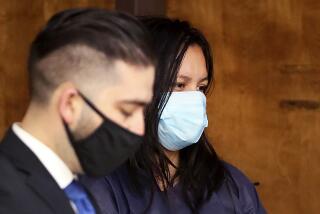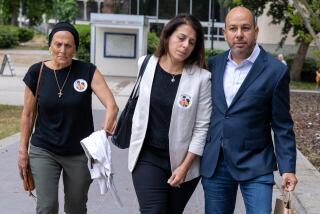Mental Health Expert Testifies for Caro
- Share via
On the night Socorro Caro shot three of her young sons to death, she “was incapable of appreciating the nature and consequences of her actions,” a mental health expert for the defense testified Tuesday.
The testimony underscored attempts by Caro’s lawyers to portray her as so drunk and depressed on Nov. 22, 1999, that she could not have known what she was doing.
During punishment debate, jurors may view such impairment as a reason to spare her the death penalty and instead recommend life in prison without parole. The Santa Rosa Valley homemaker was convicted of first-degree murder on Nov. 5.
The prosecution, however, on Tuesday attacked the conclusions of Ventura neuropsychologist Ines Monguio, arguing that Caro,44, had clearly made choices that would be logical for a mother who sought to kill her children.
“Wouldn’t her choice of a .38-caliber revolver demonstrate that the defendant was capable of understanding the nature of her act?” Deputy Dist. Atty. Jim Ellison asked.
When Monguio asked if the handgun was the only weapon available, Ellison acidly countered, “Would it make a difference? The point is she didn’t pick up a broomstick or a fly swatter to kill her children.”
Ellison also reminded jurors that Caro shot each boy once in the head, pumping a second bullet into the skull of 5-year-old Christopher. The shootings reflected Caro’s deadly intent and her knowing ability to carry it out, he said.
Monguio’s testimony came on the sixth day of the trial’s penalty phase. Closing arguments are set for Thursday, when jurors grapple with the question of whether Caro should be executed.
On the witness stand all day, Monguio said Caro was suffering a major depression with psychotic features, describing those as “a deterioration of contact with reality.”
Ellison said Caro “manipulated the outcome” of certain tests by lying. He cited, for instance, her test response indicating she thought her marriage was problem-free.
“She wasn’t being truthful with you, was she?” Ellison said.
“That’s not the same as lying,” Monguio contended, saying denial is one of Caro’s chronic symptoms.
Caro was a problem drinker, Monguio contended, citing a tequila binge the night she shot her sons.
In response, the prosecution team--for the second day--brought up a scenario aimed at persuading jurors that Caro may not have been so impaired after all, despite a blood-alcohol reading nearly twice the legal limit for drunk driving.
“Did you ever consider the possibility,” Ellison asked, “that the defendant might have killed her children--and then drank the alcohol before she shot herself?”
More to Read
Sign up for Essential California
The most important California stories and recommendations in your inbox every morning.
You may occasionally receive promotional content from the Los Angeles Times.














